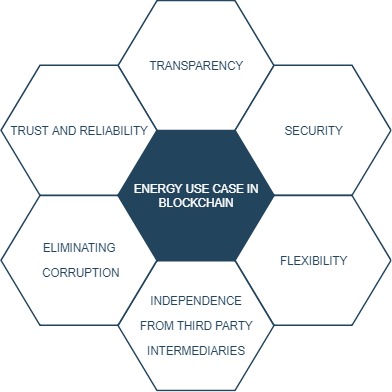

Blockchain has become a buzzword, but leaving the hype aside, blockchain in the energy sector has the potential to reduce business complexity and improve both profitability and customer experience. The use of blockchain, in combination with other emerging technologies such as smart contracts, intelligent sensors and the “internet of things,” could change user engagement and potentially alter market structures.
The physical movement of energy remains at the heart of these transactions. Therefore, it is necessary to consider how blockchain applications will interface both with physical energy infrastructure and with the regulatory framework governing the sector.
Shared below are a few significant features of Energy use case in Blockchain:

1. Trust and Reliability: Blockchain is a public ledger that provides information on all the digital transactions and shares it across the network. Thus all the energy production and consumption transactions will be stored in the ledger. Any changes made will reflect all the parties involved. Thus it responds well to any unauthorized tampering of data leading to a safer and secure ecosystem.
2. Transparency: All the data is stored within the network and is publicly viewable by all parties, thus providing transparency.
3. Eliminating Corruption: From the above two features, it is evident how Blockchain in the energy sector provides a tamper-proof environment and eradicating corruption.
4. Security: Blockchain does not have a single point of control. Integrating blockchain in the energy sector allow users to keep control of all their information and transactions. The core idea is not to put your trust in a single centralized entity but rather in the network.
5. Independence from third-party intermediaries: The decentralized storage of transaction data strengths security and ensures independence from a government or any other intermediary.
6. Flexibility: Greater flexibility in switching tariffs and suppliers of the energy sector is another benefit.
Reach out to us today, discuss with our experts!
Blockchain Technology can be utilized to securely store and validate the energy consumption and requirements of the households. Blockchain may serve as an IT infrastructure and platform to connect producers and consumers of energy in a decentralized system, called “prosumers” who own and want to sell their self-produced energy to other parties.
It can identify where the energy was produced, consumed and everything will be stored in the ledger. It can leverage the IoT applications to collect data on whether an energy consumer needs to purchase more energy or a prosumer has spare energy to sell. Based on the need to purchase or sell energy, this communication leads to an effective Energy transaction platform. This platform will establish trade between the parties that consider the current price of energy, purchase demand rate, sales demand rate etc.

Blockchain technology enables the energy sector to be controlled through smart contracts. The smart contract consists of information that the traditional legal contract would have. Smart contracts contain predefined rules created to ensure that every time a transaction is made, the transaction must be authorized by the user. Thus Blockchain acts as a secure legal verifier of all the energy transactions between different parties.
This prosumer principle has already become reality in the New York borough of Brooklyn, where the owners of solar energy systems are selling their electricity to other households in the neighbourhood.
Reach out to us today, discuss with our experts!
E-mobility means the use of electrified vehicles for individual mobility. It relies on a form of power based on the storage of energy in batteries installed in the vehicle. However, the downside to this process is the range at which the vehicle can cover with one charge compared to the vehicles with an internal combustion engine. That’s where the Blockchain technology comes into view, to create a secure, cost-effective payment system for charging the electric cars. It should be able to manage payments for toll stations, parking lots, car-sharing and parcel delivery. Blockchain technology guarantees the automatization of processes and the high degree of functionality. The technology will enable seamless, secure, and smart charging by globally integrating charging poles and electric cars into the energy system of the future.

Smart meters are electronic devices that record the production and consumption of electric energy. This simple technique will measure the energy consumption on a daily basis and bill us based on the energy price rather than paying the utility company every month. Implementing with Blockchain technology can help users save a huge amount of money since there are no third party intermediaries involved.
Reach out to us today, discuss with our experts!
To conclude, all the process of purchasing and selling electricity is connected with the high risk of corruption. Blockchain Technology provides a platform with the transparent process without opportunity for corruption, utilizing smart contracts which creates practical and safe transactions from buyer to seller. It enables direct access to the energy market and eliminating all intermediaries and third parties. It also saves time and money in the process and can yield a drastic shift in the process of consumption of energy. This technology helps to give the power over energy back to the people.
As promising as it may sound, this technology requires legal standards to accommodate to the requirements of the decentralized model. There should be measures to ensure the protection of the prosumers.